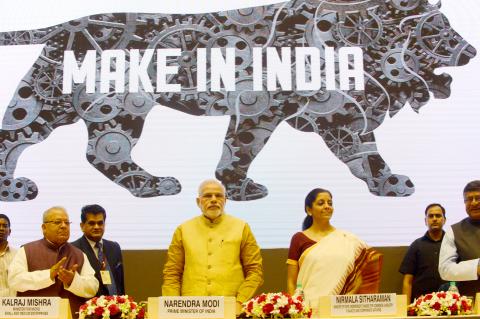Indian Prime Minister Narendra Modi yesterday pledged to slash red tape and harness the benefits of a huge young population, as he launched a campaign to attract global business to manufacture in India.
India’s business-friendly new leader wants to revive his country’s flagging economic fortunes by invigorating a manufacturing sector long eclipsed by that of neighboring China.
“We don’t need to invite the world to India; they are ready to come. We just need to give them our address,” Modi said at the launch of his “Make in India” campaign.

Photo: AFP
“India is the only country in the world that has the power of democracy, demographic dividend and demand,” he said, adding that the nation’s young people stood to benefit from manufacturing growth.
Modi’s right-wing Bharatiya Janata Party swept to power in May on a mandate to revive the economy, which is going through its worst slowdown in two decades.
The government has already relaxed rules for foreign investors, eager to create jobs for the millions of Indians who enter the employment market each year.
However, any company seeking to do business still has to contend with byzantine regulations and a stringent tax regime.
Modi said he had been “pained” to hear stories of businesses abandoning India because of an unfavorable business climate.
“I asked my staff: ‘Why are government forms so lengthy?’ And there was no reason,” Modi told business leaders, including Reliance Industries head Mukesh Ambani, India’s richest man.
Indian Minister of Commerce and Industry Nirmala Sitharaman said there was “huge untapped potential” in India for manufacturing, which accounts for just 15 percent of GDP, far less than in many other Asian nations.
“India has long been associated, unfortunately, with red-tapism and cumbersome rules and regulations. We are conscious of such perceptions,” Sitharaman said.
“We want to change that. Red tape will be replaced by the proverbial red carpet,” she said.
The World Bank recently placed India 134th among 189 economies in its ease of doing business report, while China ranked 96th.
British mobile giant Vodafone is locked in a US$2.4 billion tax row with the Indian government, while Finnish company Nokia had its plant in India seized over a tax dispute.
Kenichi Ayukawa, head of Indian car manufacturer Maruti Suzuki, said India had the potential to be a world leader in the sector, but was being held back by red tape and other issues.
“Costs of production in India increase because of various government policies, procedures, regulations and the way some of the laws are implemented,” he said at the launch, adding he was confident such barriers to growth could now be removed.
Modi launched the campaign hours before he was due to fly to the US, where he will meet heads of businesses including Google and PepsiCo on an official visit heavily focused on attracting investment.

AGING: As of last month, people aged 65 or older accounted for 20.06 percent of the total population and the number of couples who got married fell by 18,685 from 2024 Taiwan has surpassed South Korea as the country least willing to have children, with an annual crude birthrate of 4.62 per 1,000 people, Ministry of the Interior data showed yesterday. The nation was previously ranked the second-lowest country in terms of total fertility rate, or the average number of children a woman has in her lifetime. However, South Korea’s fertility rate began to recover from 2023, with total fertility rate rising from 0.72 and estimated to reach 0.82 to 0.85 by last year, and the crude birthrate projected at 6.7 per 1,000 people. Japan’s crude birthrate was projected to fall below six,

US President Donald Trump in an interview with the New York Times published on Thursday said that “it’s up to” Chinese President Xi Jinping (習近平) what China does on Taiwan, but that he would be “very unhappy” with a change in the “status quo.” “He [Xi] considers it to be a part of China, and that’s up to him what he’s going to be doing, but I’ve expressed to him that I would be very unhappy if he did that, and I don’t think he’ll do that. I hope he doesn’t do that,” Trump said. Trump made the comments in the context

SELF-DEFENSE: Tokyo has accelerated its spending goal and its defense minister said the nation needs to discuss whether it should develop nuclear-powered submarines China is ramping up objections to what it sees as Japan’s desire to acquire nuclear weapons, despite Tokyo’s longstanding renunciation of such arms, deepening another fissure in the two neighbors’ increasingly tense ties. In what appears to be a concerted effort, China’s foreign and defense ministries issued statements on Thursday condemning alleged remilitarism efforts by Tokyo. The remarks came as two of the country’s top think tanks jointly issued a 29-page report framing actions by “right-wing forces” in Japan as posing a “serious threat” to world peace. While that report did not define “right-wing forces,” the Chinese Ministry of Foreign Affairs was

PREPAREDNESS: Given the difficulty of importing ammunition during wartime, the Ministry of National Defense said it would prioritize ‘coproduction’ partnerships A newly formed unit of the Marine Corps tasked with land-based security operations has recently replaced its aging, domestically produced rifles with more advanced, US-made M4A1 rifles, a source said yesterday. The unnamed source familiar with the matter said the First Security Battalion of the Marine Corps’ Air Defense and Base Guard Group has replaced its older T65K2 rifles, which have been in service since the late 1980s, with the newly received M4A1s. The source did not say exactly when the upgrade took place or how many M4A1s were issued to the battalion. The confirmation came after Chinese-language media reported